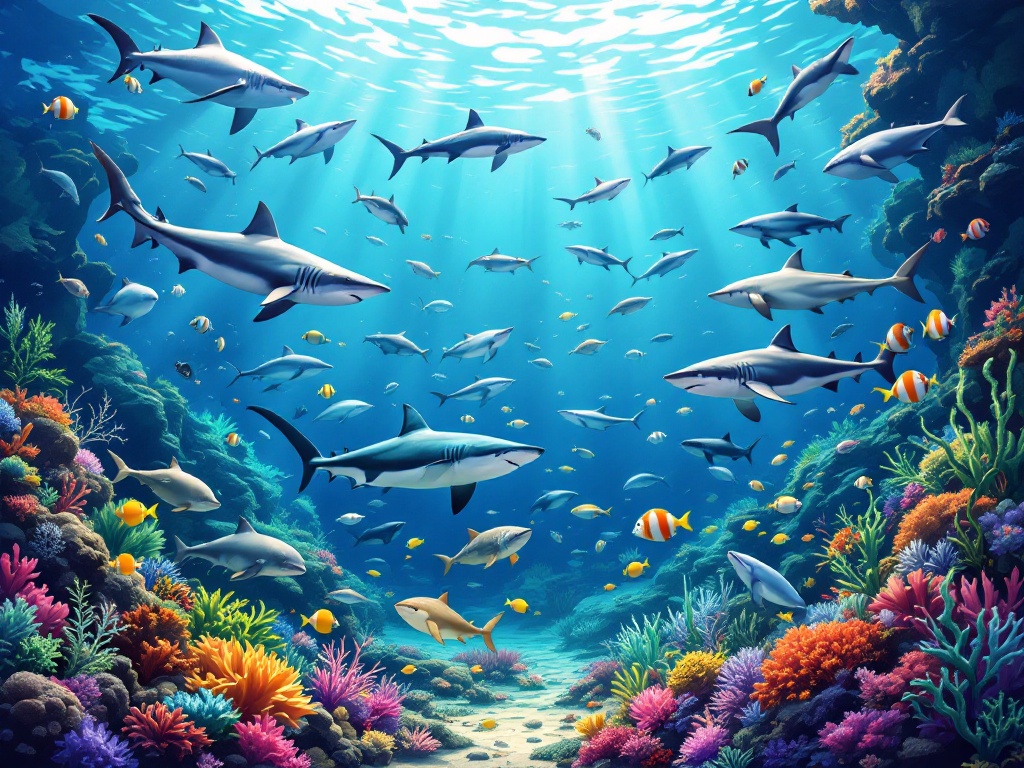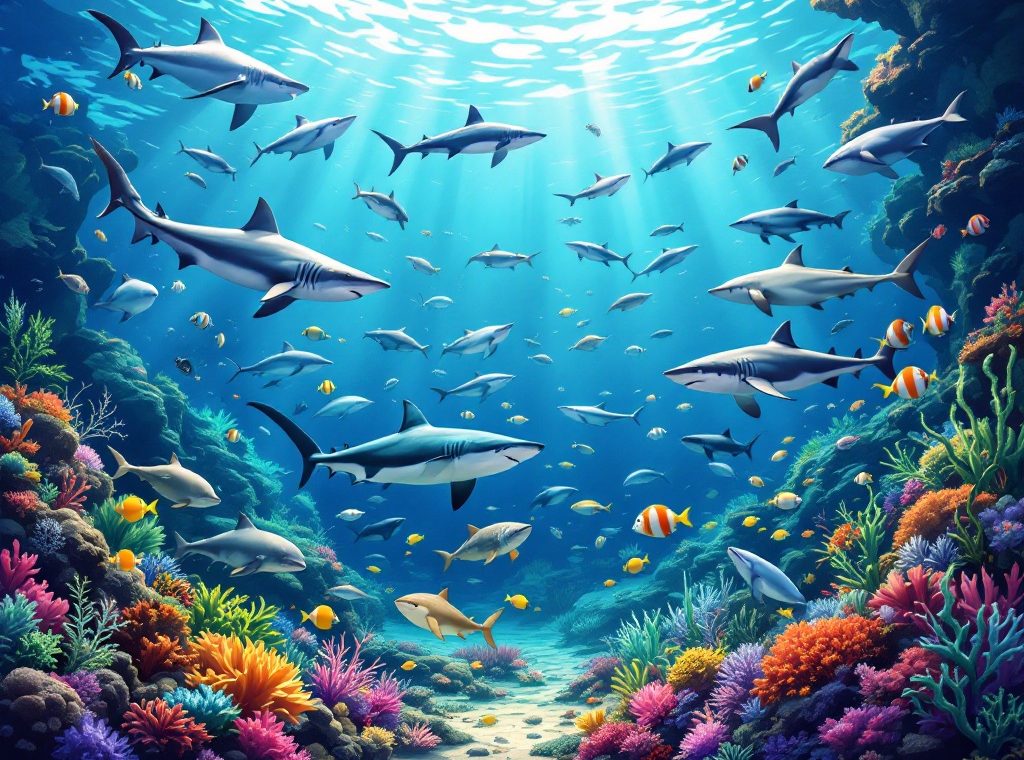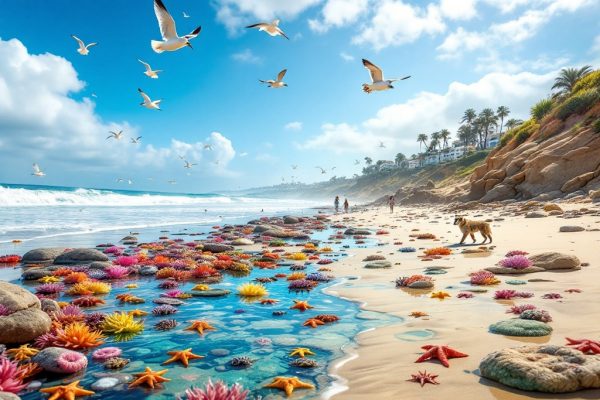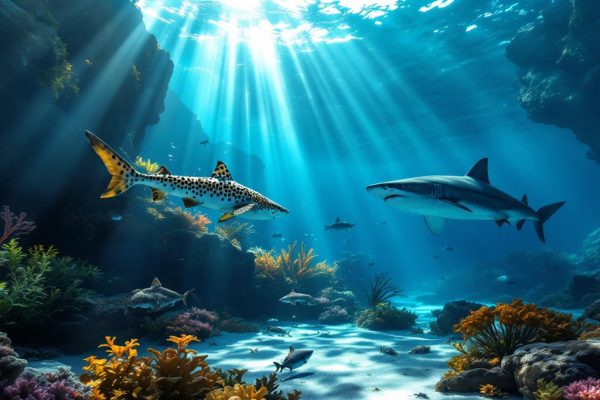Bay of Fundy Sharks and Other Wildlife
Discover the Bay of Fundy, a marine biodiversity hotspot teeming with over 2,000 species! From the rare blue shark sightings to the impressive 20-foot great white, explore the surprising variety of sharks that call these waters home. Learn about the vital role these magnificent creatures play alongside whales, dolphins, and seals in this dynamic ecosystem. Dive in and discover the ongoing conservation efforts crucial to protecting this rich marine life for future generations.
Important information

- The Bay of Fundy, known for extreme tides, supports over 2,000 marine species, creating a biodiversity hotspot.
- Diverse shark species inhabit the Bay, including the porbeagle, thresher, great white, Greenland shark, and the endangered basking shark.
- The Bay is a crucial feeding ground for several whale species, like the minke, humpback, and the endangered North Atlantic right whale.
- Threats to the Bay’s ecosystem include overfishing, bycatch, habitat loss due to pollution and climate change.
- Conservation efforts focus on strict fishing regulations, habitat restoration, wildlife monitoring, and raising public awareness.
Understanding the Bay of Fundy’s Rich Marine Life
The Bay of Fundy’s dramatic tides create a vibrant ecosystem, churning nutrients and fueling a rich food web. This dynamic environment provides vital breeding and feeding grounds for a diverse array of marine life, including fish, sharks, and marine mammals. Over 2,000 species, from porpoises and dolphins to seals, sharks, lobsters, and crabs, thrive in these productive waters. However, this crucial habitat faces growing pressures from human activities and climate change.
The Bay of Fundy: A Biodiversity Hotspot
The Bay of Fundy, renowned for its dramatic tides, boasts a variety of habitats. These range from intertidal zones and salt marshes to deep ocean basins. The powerful tides stir up nutrients, creating a rich food source for phytoplankton and zooplankton. This abundance supports a thriving ecosystem of invertebrates, fish, marine mammals, and seabirds. For many species, the Bay serves as a crucial breeding and nursery ground.
Shark Species in the Bay of Fundy
The Bay of Fundy is home to a surprising variety of sharks. While blue sharks are only occasional visitors, porbeagles consider it home. The striking thresher shark, easily identified by its elongated tail, is also sometimes sighted. Even the ocean’s apex predator, the great white shark, has been spotted in these waters. Greenland sharks, uniquely adapted to the Bay’s frigid depths, also thrive here. Other shark species found in the Bay include:
- basking sharks,
- shortfin mako sharks,
- sixgill sharks,
- tiger sharks,
- whale sharks, and
- dogfish sharks.
Blue Shark: A Rare Visitor
Blue sharks, rarely seen in the Bay of Fundy, were recently observed 31 times off Grand Manan, N.B., in a single week. This unusual sighting contrasts with their typical migratory behavior, which usually bypasses the bay. These far-ranging sharks face dwindling populations due to fishing pressures.
Porbeagle Shark: Characteristics and Habitat
Porbeagle sharks thrive in the cold, deep waters of the Bay of Fundy. Their robust, torpedo-shaped bodies are ideally suited to this challenging habitat. As a key component of the bay’s ecosystem, these sharks play a vital role. However, they are often caught accidentally in fishing gear as bycatch. This unintended capture poses a significant threat to their population.
Thresher Shark: Behavior and Sightings
Thresher sharks are known for their remarkably long tails, which they use for hunting. These powerful appendages stun prey, making them easier to catch. These elusive creatures inhabit the deeper waters of the Bay of Fundy, so sightings are rare.
Great White Shark: Notable Sightings
Off Brier Island, whale watchers were astonished by the sudden breach of a massive great white shark, estimated to be at least 20 feet long. This extraordinary sighting confirms the presence of these apex ocean predators in the Bay of Fundy.
Greenland Shark: A Unique Resident
Greenland sharks, known for their slow movements and remarkably long lifespans, inhabit the cold, deep waters of the Bay of Fundy. This environment perfectly suits these sharks, and their presence contributes to the bay’s rich biodiversity. The diverse ecosystem of the Bay of Fundy relies on the vital role played by these fascinating creatures.
Other Sharks: Basking, Shortfin Mako, and More
The Bay of Fundy is home to a remarkable variety of shark species. The impressive basking shark, the second-largest fish in the world, can be found in these waters. These gentle giants share their habitat with the more active shortfin mako and porbeagle sharks. Dogfish also play a role in the bay’s rich biodiversity. The bay’s abundant fish and plankton populations support these shark species, creating a thriving ecosystem. The presence of these sharks serves as a vital indicator of the bay’s overall health.
Shark Behavior and Interactions with Humans
While whale watching on the Bay of Fundy, you might spot a shark. Understanding their behavior ensures safe and respectful wildlife viewing, protecting both the sharks and yourself.
Shark Sightings and Whale Watching Experiences
Experience the thrill of whale watching tours in the Bay of Fundy, with the added possibility of exciting shark sightings. These unexpected encounters enrich the already exceptional wildlife experience. The bay’s diverse ecosystem supports a wide range of marine life, from whales to sharks, making it a truly unique destination.
Whales and Marine Mammals of the Bay
The Bay of Fundy is home to a variety of whale species, including Minke, Humpback, and the endangered North Atlantic right whale. These magnificent creatures feed mainly on krill, squid, and herring. The bay’s rich ecosystem also supports other marine mammals such as dolphins, seals, and porpoises.
Whale Species: Minke, Humpback, and Northern Right Whale
The Bay of Fundy provides a habitat for three whale species: minke, humpback, and the critically endangered North Atlantic right whale. Humpbacks are renowned for their acrobatic displays and diverse feeding habits. Minkes, the smallest baleen whales in the bay, are noted for their speed and agility. North Atlantic right whales migrate to the bay to feed.
Marine Mammals: Dolphins, Seals, and Porpoises
The Bay of Fundy provides a habitat for a variety of marine mammals, including dolphins, seals, and porpoises. These animals play a crucial role in the ecosystem. They are also a popular attraction for wildlife enthusiasts, contributing significantly to the local tourism industry.
Conservation Efforts in the Bay of Fundy
The Bay of Fundy faces serious threats, but conservation efforts offer hope. Strict fishing regulations are now in place. Vital habitats are being preserved and restored. Scientists actively monitor wildlife, particularly endangered species like the North Atlantic right whale. Through educational programs and research initiatives, understanding of the bay’s ecosystem is growing. These combined efforts are crucial for protecting the bay’s diverse species and ensuring its future.
Strict fishing regulations are in place to protect the bay’s resources.
Vital habitats are being preserved and restored to maintain biodiversity.
Scientists actively monitor wildlife, particularly endangered species like the North Atlantic right whale.
Educational programs and research initiatives increase understanding of the bay’s ecosystem.
These combined efforts are crucial for protecting the bay’s diverse species and ensuring its future.
Shark Population Decline: Causes and Solutions
Sharks face numerous threats, the most direct being overfishing, which drastically reduces their populations. Bycatch, the accidental capture of sharks in fishing gear meant for other species, also poses a significant danger. Habitat loss, caused by pollution and climate change, further jeopardizes their survival by degrading essential environments. However, there are solutions. Implementing sustainable fishing practices helps maintain healthy fish populations and reduces pressure on sharks. Modifying fishing gear minimizes bycatch, preventing unintended shark captures. Pollution mitigation creates cleaner oceans, benefiting all marine life, including sharks. Establishing protected areas provides safe havens for shark populations to recover and thrive. Finally, raising public awareness about shark conservation is crucial for their long-term survival, as these magnificent creatures play a vital role in maintaining a healthy ocean ecosystem.
Threats
- Overfishing directly reduces shark populations.
- Bycatch is the accidental capture of sharks in fishing gear intended for other species.
- Habitat loss due to pollution and climate change degrades essential environments.
Solutions
- Sustainable fishing practices maintain healthy fish populations.
- Modified fishing gear reduces bycatch.
- Pollution mitigation creates cleaner oceans.
- Protected areas offer safe havens for shark populations.
- Raising public awareness is crucial for long-term shark survival.
Endangered Species: Basking Shark and More
The endangered basking shark, recognized under Canada’s Species at Risk Act, shares the Bay of Fundy with other vulnerable creatures. This vital habitat is also home to the North Atlantic right whale, the harbor porpoise, and the leatherback sea turtle. These animals face numerous threats, including entanglement in fishing gear and collisions with ships. Habitat degradation and climate change further compound these dangers. Fortunately, ongoing conservation efforts, led by dedicated researchers, are working to monitor these species and implement protective measures to mitigate these risks.













